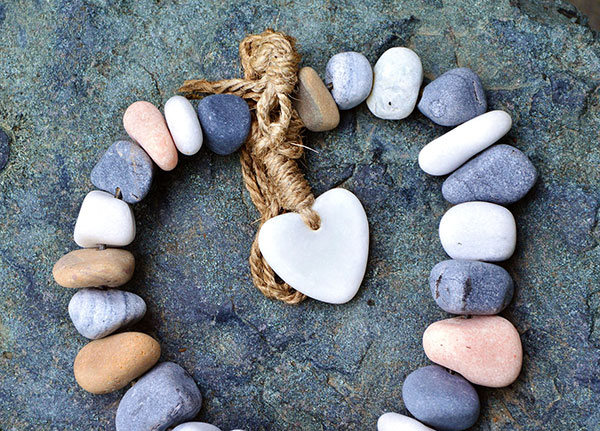Do those two things go together for you – self-compassion and the holidays? Are you filled with understanding, acceptance and loving kindness, for yourself, during the holidays? I am imagining that if you are like most people, the holidays bring up more worry and stress than kindness and understanding, for oneself, and if you struggle with your weight or eating, maybe there is that, all too familiar, swing between being “good” and “what the heck”.
I want to spend a little time in this post talking about how adding some self-compassion might be worth considering this holiday season. I am going to direct this toward eating and the ideas apply to any stress you might be experiencing this holiday season. If you are unfamiliar with the idea of self-compassion, it basically has to do with seeing ourselves, just as we are in the moment, with kindness, acceptance and without any judgment while, at the same time, realizing that we all struggle. It is part of being human. So what would adding some self-compassion look like?
It might go something like this. You arrive at a holiday dinner with a great plan of staying connected with yourself and taking care of yourself around food. As you sit down to the table, all of the wonderful aromas fill your nostrils with pleasure and your eyes take in sights of foods that you haven’t eaten since the last holiday season. There is much excitement as you gather with your friends and family to enjoy the meal and before you know it you have eaten much more than was comfortable for you. This is where the self-compassion comes in.
Instead of saying “oh my gosh, what is wrong with me? I am such a failure”, a self-compassionate response might be, “Hmmm, I just ate more than I wish I would have. Okay, that is where I am right now, in this moment. Everyone eats more than they want to at times, especially at the holidays – even people who don’t struggle with their eating. I am uncomfortable right now. I’m going to be as understanding and kind to myself as I can.”
What thoughts and feelings came up for you as you read that? What comes up for you when you think of being compassionate toward yourself? Are you worried that you will be “making excuses” or be “giving yourself permission to overeat”? Self-compassion is not the same as self-indulgence. It is a skill which allows the opportunity to see one’s self, clearly in the moment, which then provides the opportunity for better self-care.
 I think there is this notion that if we are kind to ourselves we will never get anywhere – that we need to be tough or harsh if we want to be successful in making changes.
I think there is this notion that if we are kind to ourselves we will never get anywhere – that we need to be tough or harsh if we want to be successful in making changes.
Part of this, I think comes from the whole diet mentality. When we are on a diet we are either being “good” or “bad”. There is no in between with this! Either we are rigidly following the plan or it is a “free for all”. So the idea of being kind to ourselves, when we have overeaten and have that be a positive, just doesn’t compute for most people with a history of dieting.
But, think about it. What happens when you berate yourself? How do you feel? Secure? Motivated? Probably not. More like defeated or guilty? And what often happens when those feelings come up? Do you eat more?
Consider this study. Adams and Leary (2007) studied restrictive eaters who experienced “high eating guilt” (wouldn’t this be most dieters?). All of the participants were instructed to eat donuts. I actually can’t remember whether this was one or several. Afterwards, some of the participants were given instruction to think about the donuts they had eaten in a compassionate manner and the others were not given any instruction. Those that received the instruction in self-compassion ate less, at a subsequent taste testing, than did those who did not practice the self-compassion. So the self-compassion led to less eating rather than more.
 And there is research to support the idea that self-compassion, or being kind and understanding to oneself, during stress or following mistakes allows individuals to acknowledge their mistakes without being overwhelmed with negative feelings (Leary, Allen, Adams, & Hancock, 2007). Wouldn’t this be helpful after overeating? To be able to accept what just happened and then figure out what might work better next time, without being overwhelmed with guilt and self-criticism?
And there is research to support the idea that self-compassion, or being kind and understanding to oneself, during stress or following mistakes allows individuals to acknowledge their mistakes without being overwhelmed with negative feelings (Leary, Allen, Adams, & Hancock, 2007). Wouldn’t this be helpful after overeating? To be able to accept what just happened and then figure out what might work better next time, without being overwhelmed with guilt and self-criticism?
So, what do you think? Would it be worth a try? Or, does the whole idea scare you? I would love to hear from you, either way, and also if you gave it a try this holiday season. So, please drop in and leave a comment below. Much of what I have learned about self-compassion, I have learned from studying the work of Kristen Neff Ph.D and Christopher Germer, Ph.D. Both have great websites with loads of information, as well as downloadable meditations.
Until next time….. how might you Flourish in your body?
Adams, C.E., and Leary, M.R. 2007. Promoting self-compassionate attitude towards eating among restrictive and guilty eaters. Journal of Social and Clinical Psychology, 26 (10), 1120-44.
Leary, M.R., Adams, C.E., Allen, A.G., Hancock, J. 2007. Self-Compassion and reaction to unpleasant self-relevant events: The implications of treating oneself kindly. Journal of Personality and Social Psychology, 92 (5), 887-904.

Great post! You are going to get a chuckle when you see my newsletter for Jan.
Thanks, Nicole! Can’t wait to read it!